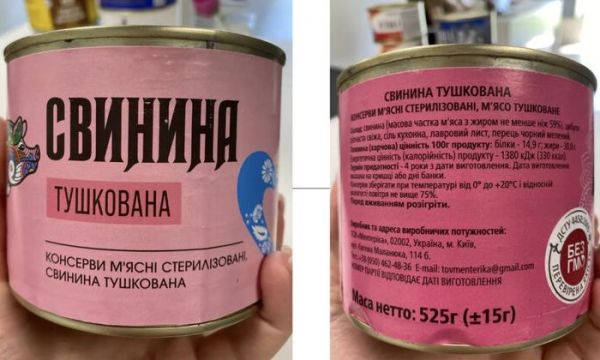Некоторые поставщики Минобороны пытаются отравить бойцов на передовой


В Минобороны очередной скандал с питанием бойцов ВСУ. Оказалось, что одна из лабораторий министерства фактически позволила подлым поставщикам отправлять на фронт некачественную тушенку.
К сожалению, это не единственный случай, и он заставляет в очередной раз говорить о главном источнике этой истории — отсутствие реформы питания армии, сохранение закупки по каталогу, а также то, что Министерство обороны не сделало вообще ничего для выполнения требований антикоррупционной стратегии по внедрению реестра поставщиков
В результате «проверенные» поставщики, которые сохранили свои позиции на «рынке» продолжают демпинговать между собой цены для того, чтобы выиграть тендеры с самой низкой ценой дободачи, а эту самую низкую цену обеспечивают за счет прежде всего низкого качества мяса.
Ситуация дошла до того, что заводы, которые имеют собственные мощности по производству мяса, просто отказываются ставить на нем свою маркировку, потому что потом его накачивают таким количеством воды, что отвечать за это никто не хочет.
«Средняя цена курятины в каталоге — 120 грн. Вы на рынке сейчас такую курицу нигде не найдете. В результате наши военные получают воду в куриной шкурке», — рассказывает Цензор.НЕТ.
В сентябре военные переслали автору фото свинины и курятины, которые получают под Покровском — на одном из самых сложных направлений фронта.
Нашим защитникам привозили мясо, которое просто разлазится в руках после разморозки и сходит пеной.
Эту область обеспечивает компания «Трейд гранит инвест», которую называют приближенной к бизнесменам Адамовскому и Якубовскому.
Этот тендер компания получила в июле, после того, как на этом направлении не справилась с поставками компания «Гранпри».
Через неделю после публикации фото мяса состоялась презентация реформы питания от ДОТ, на которой автор услышала диалог руководительницы «Трейд гранита» Юлии Павличенко с представительницей Государственного оператора тыла Галиной Литыш по смене подрядчика, который возит мясо.
После этого питание подразделения, которое показало мясо, стало значительно лучше. Но это не исправило всю картину.
И аналогичные проблемы с качеством на том же направлении стали предметом расследования львовских коллег.
В начале июля с NGL.media связался Дмитрий Власенко, офицер управления одного из батальонов, держащих оборону на Покровском направлении. Он рассказал о плохом качестве продуктов, которые получает не только его батальон. И передал несколько банок тушенки. Сначала журналисты попробовали это есть, но решили, что лучше не травиться.
Поэтому дальше редакция сдала тушенку на экспертизу и установила, что лаборатория воинской части А3466 Управления безопасности пищевых продуктов и ветеринарной медицины Министерства обороны Украины одобрила поставку в ВСУ почти 11 тыс. банок тушеной свинины, которая непригодна к употреблению.
Результаты экспертизы показали, что образцы консервы не соответствуют ДСТУ по органолептическим и физико-химическим показателям. Это означает, что такие консервы нельзя продавать или потреблять.
Эксперты установили, что более 60% содержимого банки составляет вода — точнее жидкий бульон».
Интересно, что большинство из тушенок не удалось купить в маркетах. А покупает ее «Трейд гранит» у киевской компании ООО «Ментерика», которая является по сути лишь вывеской, а не производителем. ООО «Ментерика» основали в 2021 году. Номер телефона ООО «Ментерика», который указан при регистрации, имеют еще около 2 тысяч компаний. Владельцем и директором компании является Владимир Мартыненко.
ООО «Ментерика» продает товар «Трейд гранит» через еще одну фирму посредника. И при этом все утверждают, что имеют надлежащие документы. Но …
«Контроль качества консервов, поставляемых ВСУ, осуществляется на этапе производства. То есть до непосредственной поставки в воинские части. Управление безопасности пищевых продуктов и ветеринарной медицины отбирает контрольные образцы из партии, отправляет их на лабораторный анализ и, в случае положительного заключения о пригодности к употреблению, выдает сертификат качества на поставку соответствующей партии. В течение августа (именно об этом периоде говорится в журналистском материале) ДОТ не поступало ни одной официальной жалобы от воинских частей относительно неудовлетворительного качества консервных изделий», — говорится в комментарии ДОТ.
Для того, чтобы усилить контроль за качеством продукции, Государственный оператор тыла, по запросу Министерства обороны, планирует цифровизировать процесс подтверждения наличия сертификатов качества. А именно — ввести системное решение в ИТ-системе управления обеспечением ВСУ — DOT-Chain. Планируется, что к расходной накладной в ИТ-системе поставщик будет указывать номер сертификата качества, что позволит отслеживать, действительно ли эта партия соответствует требованиям качества или нет. Но это пока о будущем. И то, что ДОТ не получает жалоб, это не значит, что их нет.
В августе экс-депутат, а ныне военная Татьяна Черновол написала колонку о том, что на войне есть три худших запаха — мертвечины, мышей и мяса, которое поставляют ВСУ.
К сожалению, эта жалоба не единственная. В этом году жалоб на качество продуктов больше, чем в прошлом.
И, к сожалению, члены общественного антикоррупционного совета предупреждали об этом еще год назад. Потому что когда закупки продуктов были возвращены на Прозорро, и это привело к экономии в почти 4 миллиарда, субподрядчики нам сказали: «Они просто отыгрываются на качестве. Никто не будет терять свою маржу, тем более, что поставщик получает только ¼ маржи, остальное идет наверх»…
Одним из первых признаков такой игры стала консервированная свинина, которую получали части на Киевщине. В банке были кости и сухожилия, а не мясо. Но когда члены ГАР МО получили исходные данные банки, то оказалось, что партия прошла проверку, и качество было хорошим.
Уже потом ГАР МО узнала о способе, когда после прохождения экспертизы под теми же номерами выпускают больше продукта, уже гораздо худшего качества.
С того времени прошло больше года. Был запущен Государственный оператор тыла, увеличено количество проверок. Но буквально вчера автор говорила с коллегами из ГАР МО и военными об оптимизации работы горячих линий МО для приема анонимных жалоб на еду, потому что их много.
И, к сожалению, это не исправят проверки. То есть исправят, возможно, точечно, но не глобально.
Потому что, как я уже отметила в начале, есть глобальная проблема с каталогом. Министерство обороны не покупает отдельно тушенку или мясо. Нет, оно покупает эфемерную дободачу — трехразовое питание военного. Сейчас оно обходится государству где-то 110 грн. На самом деле, за такую цену невозможно нормально питаться.
«Мы едим сардельки, которые собакам давать страшно», — говорит в разговоре один из военных.
По сути, нынешний каталог питания военных с 365 позиций выполняет функцию ширмы. За которой скрывается сомнительная игра с ценами.
Если взять, например, каталог компании «Атомсервис», то можно увидеть, что цена на брокколи свежую сезонную опущена с 80 до 48 грн. Капуста цветная свежая снижена в цене с 90 грн до 54. Щавель свежий сброшен со 180 грн до 120. Форель охлажденная снижена в цене с 450 до 360 грн. И, скорее всего, поставщик никогда не будет возить этот товар.
Зато яйца первого сорта при предельной цене от ДОТ 3,1 будут поставляться за 3 гривны. А яйца высшего сорта снижены в цене аж на 22 копейки. Вермишель длинная (твердых сортов) при предельной цене 31,5 будет поставляться по цене 30,6. Меньше гривны разницы. Рожки и макароны упали в цене тоже только на гривну с 22 до 21 гривны.
Если поставщик имеет контакты с военными частями, а старые поставщики их точно имеют, то он не будет иметь проблем с заказом 300 грамм спаржи. А будет поставлять продукт, который у него есть, и с которого будет иметь маржу.
А вот новый поставщик, который кому-то перешел дорогу, скорее всего, вылетит по той же причине. Он не имеет контакта с начпродом.
При первых торгах по питанию ДОТ пытался изменить квалификационные критерии для производителей, рассчитывая на более качественного поставщика, чем привычные «Рога и ракотицы», которые обслуживают МО. Но вместо этого старые поставщики взбунтовались. Сначала они поставили МО ультиматум вернуть старые квалифкритерии, а дальше и вообще отозвали свои предложения по торгам на Прозорро.
ДОТ вынужден был обратиться к подрядчикам старых поставщиков, чтобы они заключили с ним контракты. Некоторые согласились. Среди них были, кстати, два производителя консервов. Это «Буский консервный завод» (как продолжение линии семьи Гринкевичей) с большим списком нареканий на качество консервов в предыдущие годы, и ООО «Черкасский мясокомбинат».
Последний принадлежит к орбите бывшего председателя Черкасской ОГА Юрия Ткаченко. Среди активов группы Ткаченко — сеть магазинов «Молли» и рынок «Фермерский» в Черкассах, компании «Золотоношский бекон» и «Золотоношская индюшачья фабрика».
Весной «Черкасский мясокомбинат» смог продержаться в поставках всего несколько недель. Несмотря на то, что во время ревизии ДОТ обнаружил в компании заполненные склады и только более 100 работников на одном складе, компания имела постоянные проблемы с логистикой из-за изменения заказов и тем, что у нее не принимали товар.
Собеседники в ДОТ весной рассказали, что компания даже сделала запись разговора с одним из начпродов, который прямо сказал, что не примет товар.
Это было не все — ЧМК, как и большинство поставщиков, в те дни столкнулись с проблемой, что субподрядчики, которых они нашли, отказывались от поставок, потому что старые поставщики им тупо пригрозили, что не вернут деньги, если те пойдут к новым. Учитывая то, что поставщики определенных групп товаров тесно между собой связаны, например, фруктов, то завал поставок для новых компаний становился просто неизбежным.
Эту историю автор знает от самих субподрядчиков, которые жаловались, что им не возвращают деньги. Эта проблема нерешена — многие производители имеют полные склады, но работать с МО не хотят. Как и быть заложниками демпинга цен.
Что произошло собственно с невыплаченными деньгами — потом хорошо объяснила история с багажником с 4,7 миллионами евро.
Но это в весенней эпопее не самое интересное. ЧМК потом по прямым договорам заменил «Контракт продрезерв». Он был следующим в очереди. Но когда соглашения ЧМК еще действовали, некоторые воинские части получили странные письма где-то такого содержания.
После этого в поставки для ДОТ зашел один из представителей крупного ритейла и консорциум производителей.
Но через некоторое время они тоже прекратили поставки продуктов для войска. Некоторых старые поставщики замучили судами за склады, некоторые решили выйти с минимальными потерями и подготовиться лучше к следующим торгам. Некоторые сомневаются, стоит ли это того и просто хотят получить деньги через суды.
В начале сентября ДОТ презентовал новую версию реформы закупки продуктов. Часть областей будет работать по новой пилотной системе. Сначала проведут сигнальные торги среди производителей 6 групп товаров (в частности, молочки и мясной группы), а затем выбранный ДОТ оператор заключит с ними договоры.
Хотя новая система значительно ближе к расторжению каталога, который позволяет махлевать с ценами, у потенциальных участников торгов есть множество вопросов. Может ли производитель одного из видов продукции стать оператором? Кажется, нет. То есть либо вози, либо продавай свое мясо. Что в принципе и логично. Хотя денег обещает меньше.
Здесь главное, чтобы критерии для производителей оказались правильными.
Но это еще не все. Часть из поставщиков не уверены, что смогут зайти в новый цикл. И здесь самая большая проблема с тем, что и те, кто частично поставлял, и не смог удержаться, и те, кто стал субподрядчиком, до сих пор не получают денег.
Сейчас на рынке работают большинство старых почтачальников — «Атомсервис», «Мит пром» как новый фасад группы Глиняной, «Контракт продерезерв», «Юг прод торг», «Бугский консервный завод» связанный с семьей Гринкевичей. Новые оказываются тоже с ними связаны. По меньшей мере переходом менеджеров.
Сможет ли новая система изменить этот ландшафт — неизвестно. Как минимум, большинство поставок все равно произойдет по проверенной системе, с каталогом.
А потому, вполне вероятно, кто-то снова будет есть мясо из воды и тушенку из хрящей.
Здесь бы мог помочь единый реестр поставщиков. Его создание предусмотрено антикоррупционной стратегией и рекомендациями НАТО. Но министерство и профильный департамент политики не сделал в этом направлении вообще ничего.
Так же как не сделано ничего для создания квалификационных критериев для подписания прямых договоров, так же как применение или отмена хозяйственных санкций. Если этого не будет, то даже в случае уголовных производств за некачественные продукты некоторые поставщики просто сменят вывески. Доведено до идеала группой Глиняной.
Recent Posts
Сбежавший в Швейцарию блогер Станислав Домбровский просит прощения у украинцев
Одесский трэш блогер Стас Домбровский, который в последнее время проживает в Швейцарии, записал видеообращение к…
Александра Устинова и атака на руководство АОЗ: что стоит за волной критики
Александра Устинова, народная депутат, которая в последние дни активно атакует Агентство оборонных закупок (АОЗ) возможно…
Журналисты показали имение киевской судьи, закрывшей дело Приходько
Свобода "под ключ" или манипуляция правосудием? Борис Приходько – нацбанкир времен Януковича и действующий нардеп…
Судьи вне закона
В течение последних трех лет внимание общественности если и бывает приковано к судам, то гораздо…
Артем Ляшанов и bill_line спасают репутацию через суд
Финтех-компания столкнулась с обвинениями в отмывании денег игорной мафии. ООО «Тех-Софт Атлас» (ТМ «bill_line») и…
Криптобиржа WhiteBIT: как Владимир Носов и «регионалы» Шенцевы отмывают деньги и помогают спецслужбам России
Владимир Носов в Украине пытается позиционировать себя как респектабельный бизнесмен и хозяин криптобиржи WhiteBIT. Однако…


